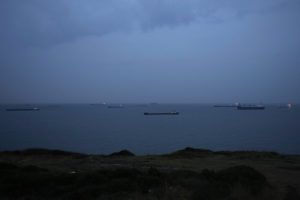Using Nature to Heal Nature
Can storing plants in the bottom of the Black Sea help remove carbon dioxide from the atmosphere? Black Sea before sunset. (Photo: Enitsa Koeva/Flickr/cc)
Black Sea before sunset. (Photo: Enitsa Koeva/Flickr/cc)
As evidence that climate change will have disastrous consequences mounts, markets are scrambling to find solutions. One proposal is for a brand-new extractive industry known as deep-sea mining, which will involve vacuuming the seafloor to obtain minerals used in battery-reliant technologies designed to wean the world off burning fossil fuels.
Another, as reported by Grist, is to remove carbon by storing plants at the bottom of the Black Sea. This is the mission of Rewind, a startup aiming to deposit enormous amounts of organic matter – trees, leaves, food, soil – in the depths of the Black Sea as a means of removing carbon dioxide, the heat-trapping gas that’s changing weather patterns, from the atmosphere.
Here’s the logic behind the company’s mission: plants remove carbon dioxide from the air, but when they decompose, the gas gets released. Storing plants in a place where they’ll take thousands of years to decompose will, it follows, remove carbon dioxide from the atmosphere.
According to Rewind’s website, the Black Sea is “big enough to contain all the CO2 humanity needs to remove.”
It’s hard to measure the sequestration, or storage, of carbon, but it’s true that the Black Sea possesses an extraordinary power to preserve. The Black Sea is mostly anoxic, meaning that below its top layers, there isn’t a lot of oxygen or movement. Below about 300 feet, there’s almost none. This natural anomaly has spawned a lot of talk about bodies that hang suspended for years, unperturbed, without decomposing.
In 2017, researchers found the intact wreck of a 75-foot ship at the bottom of the Black Sea; a piece of it was carbon-dated at the University of Southampton, and the results suggested the wreck was Greek and 2,400 years old.
According to Rewind’s website, the Black Sea is “big enough to contain all the CO2 humanity needs to remove.” The company’s business model hinges on storing a gigaton of waste per year, thus removing billions of tons of carbon from the atmosphere for thousands of years.
In a report released in late 2022, the Intergovernmental Panel on Climate Change (IPCC) recommended removing up to 10 gigatons, or 10 billion metric tons, of carbon dioxide from the atmosphere annually by 2050 to curb the pace of global warming.
Inger Andersen, executive director of the United Nations Environment Program, said in a statement that the report describes, in “cold scientific terms, what nature has been telling us all year, through deadly floods, storms and raging fires: We have to stop filling our atmosphere with greenhouse gases and stop doing it fast.”
Mining removes matter from the deep sea and Rewind’s model adds it. But in both cases, the deep sea is being used to cover up humanity’s mistakes.
Your support matters…Independent journalism is under threat and overshadowed by heavily funded mainstream media.
You can help level the playing field. Become a member.
Your tax-deductible contribution keeps us digging beneath the headlines to give you thought-provoking, investigative reporting and analysis that unearths what's really happening- without compromise.
Give today to support our courageous, independent journalists.





You need to be a supporter to comment.
There are currently no responses to this article.
Be the first to respond.